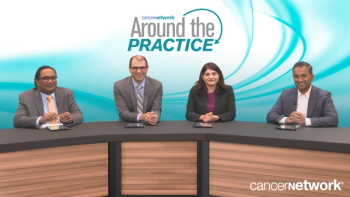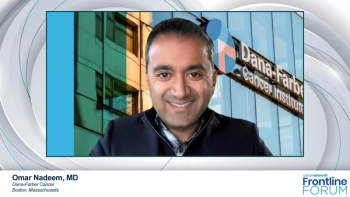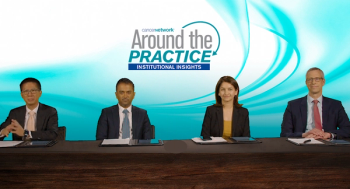
In this segment, Dr Mohan asks Dr Mann about emerging investigational agents for the management of relapsed/refractory multiple myeloma (R/R MM) that show particular promise.

Your AI-Trained Oncology Knowledge Connection!


In this segment, Dr Mohan asks Dr Mann about emerging investigational agents for the management of relapsed/refractory multiple myeloma (R/R MM) that show particular promise.

In this segment, Dr Mohan asks Dr Nadeem about the real-world performance of elranatamab, its advantages and challenges in clinical practice, and the next therapeutic approach if a patient experiences disease progression on elranatamab.

In this segment, Dr. Mohan asks Dr. Mann to summarize the key efficacy data from the MagnestisMM trials evaluating the use of elranatamab in relapsed/refractory multiple myeloma (R/R MM).


Panelists discuss how bispecific antibodies targeting B-cell maturation agent, GPRC5D, and FcRH5 are transforming relapsed/refractory multiple myeloma treatment (R/R MM) with promising efficacy, manageable safety profiles, and convenient off-the-shelf administration.

Dr Mohan asks Dr Nadeem about the selection process among bispecific antibodies, the factors influencing decision-making, and the use of talquetamab, teclistamab, or elranatamab in specific patient subgroups, followed by a discussion with Dr Mann on next therapeutic steps if a patient experiences disease progression on talquetamab.

Dr Mohan and Dr Mann discuss the current therapeutic landscape for relapsed/refractory multiple myeloma (R/R MM), alternative treatment strategies, and the real-world performance, advantages, and challenges of incorporating talquetamab into treatment protocols.

Panelists discuss how sequential B-cell maturation agent (BCMA)–targeting therapies can be effective despite potential resistance patterns, with experts evaluating factors like prior response duration, alternative targets like GPRC5D or FcRH5, and patient-specific characteristics when deciding treatment sequencing after CAR T progression.

Panelists discuss how teclistamab administration and outcomes vary between academic and community settings, highlighting the need for standardized monitoring protocols, staff education, and communication frameworks to ensure consistent patient care and safety across different practice environments.

Panelists discuss how long-term follow-up data from MajesTEC-1 demonstrates teclistamab’s sustained efficacy and safety profile while identifying optimal candidates based on factors like prior therapy exposure, disease characteristics, and fitness level.

Panelists discuss how talquetamab demonstrates superior efficacy compared with physician-chosen treatments for patients with heavily pretreated multiple myeloma, with improved progression-free survival and response rates.

Dr Nadeem to summarize the clinical evidence supporting talquetamab use in relapsed/refractory multiple myeloma, including key efficacy outcomes from the monumenTAL trials.

68-year-old male construction worker with a long history of multiple myeloma, managing multiple lines of treatment including BCMA-directed CAR T therapy, alongside a history of hypertension, respiratory infections, and type 2 diabetes, now receiving talquetamab.

Panelists discuss how emerging therapies like bispecific antibodies, chimeric antigen receptor (CAR) T cells, and novel drug combinations are reshaping treatment options for patients with relapsed/refractory multiple myeloma (R/R MM) who have exhausted standard approaches.

Dr Nadeem discusses his approach to sequencing bispecifics vs chimeric antigen receptor T-cell therapies, including B-cell maturation antigen (BCMA) and non-BCMA bispecifics, and the factors he considers, followed by key takeaways from a recent meeting on bispecifics in relapsed/refractory multiple myeloma, focusing on dosing, adverse event management, and clinical pearls for oncologists.

Dr Nadeem discusses his case details and shares his initial thoughts. He then reviews the current treatment landscape for relapsed/refractory multiple myeloma, including his experience with bispecifics in practice and his challenges in using them.

Closing out their discussion on relapsed/refractory multiple myeloma, experts consider adverse event management in patients receiving bispecifics followed by future directions in care.

Comprehensive perspectives on the role of bispecific antibodies in the treatment of relapsed/refractory multiple myeloma.

A brief review of the use of CAR T-cell therapy in patients with relapsed/refractory multiple myeloma.

Moving to the last patient profile, expert panelists discuss a patient with triple-class refractory multiple myeloma managed with BCMA-targeting bispecific therapy.

Shared insight on the selection of therapy for patients with transplant-ineligible, newly diagnosed multiple myeloma and high-risk cytogenetics.

Expert panelists consider which regimen they would use, and for what duration, in the setting of transplant-ineligible, newly diagnosed multiple myeloma.

The panel moves on to review the profile of a patient with transplant-ineligible, newly diagnosed multiple myeloma managed with dara-Rd on the MAIA trial.

Before closing their discussion on transplant-eligible, newly diagnosed multiple myeloma, experts consider duration of therapy in this setting.

Panelists briefly review factors they use to select induction therapy for patients with transplant-eligible, newly diagnosed multiple myeloma.

Shared insight on approved quadruplet vs triplet induction regimens for patients with transplant-eligible, newly diagnosed multiple myeloma, evaluated in the GRIFFIN, MASTER and GMMG-HD7 trials.

Experts discuss a patient with transplant-eligible, newly diagnosed multiple myeloma managed with induction daratumumab-RVd and maintenance therapy.

Published: July 19th 2022 | Updated:

Published: July 6th 2022 | Updated:

Published: December 23rd 2024 | Updated:

Published: July 11th 2022 | Updated:

Published: July 11th 2022 | Updated:

Published: July 6th 2022 | Updated: